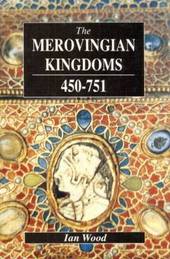
|
The Merovingian Kingdoms, 450-751
Paperback
Main Details
| Title |
The Merovingian Kingdoms, 450-751
|
| Authors and Contributors |
By (author) Ian Wood
|
| Physical Properties |
| Format:Paperback | | Pages:408 | | Dimensions(mm): Height 236,Width 157 |
|
| ISBN/Barcode |
9780582493728
|
| Classifications | Dewey:940.1 |
|---|
| Audience | | Professional & Vocational | |
|---|
| Illustrations |
bibliography
|
|
Publishing Details |
| Publisher |
Taylor & Francis Ltd
|
| Imprint |
Longman
|
| Publication Date |
29 November 1993 |
| Publication Country |
United Kingdom
|
Description
A comprehensive scholarly survey of the Merovingian dynasty's 300-year rule of the Frankish,kingdom they founded in France, Belgium, the Rhineland and Switzerland. The kingdom was the largest, the most powerful and longest-enduring of all Imperial Rome's western successors, yet the Merovingians themselves have been harshly treared by posterity (largely because of the hostility of the Carolingian dynasty that usurped and succeeeded them). Ian Wood rescues them from the shadows of obscurity and contempt in this major contribution to early medieval historiography: he brings to life one of the most fomative yet least understood periods of Western European History. Period reassessed entirely from original sources: major scholarly undertaking that should become the standard study of the subject for the next generation of scholars Covers all aspects of the Merovingian period, and considers their influence not just on their own territories but also on Europe more widely, reassessing their cultural importance to the sixth and seventh centuries. Re-evaluates Merovingian history in the light on contemporary opinion, as far as that can be recovered, away from the hostile historiography of their Carolingian successors. A recurrent motif throughout the book is the central role played by their formidable womenfolk, foremost among them the rival queens and matriarchus, Fredegund and Brunhild.
Reviews'xxx; the most detailed account of the Merovingian kingdoms available in any language, and the most exciting xxx; this book should be required reading for anyone interested in the early Middle Ages, whether archaeologist or historian.' British Archaeological News
|